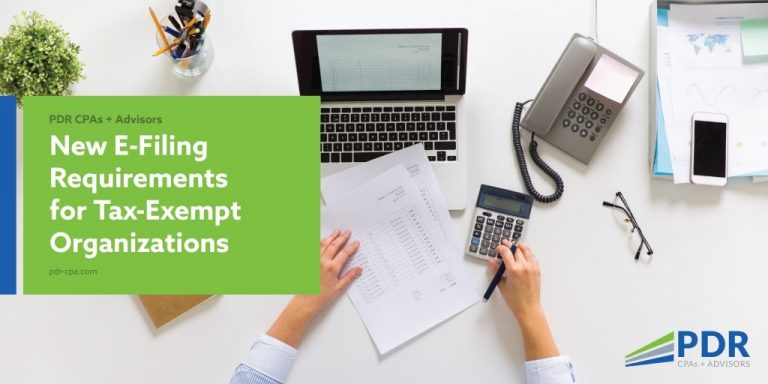Taxpayer First Act
As of July 1, 2019, The IRS (Internal Revenue Service) has been required to modernize operations and increase taxpayer protection. The Taxpayer First Act was signed by President Trump with the aim of the IRS’s technological improvement and reinforcing cybersecurity measures. The new law states that all tax-exempt organizations need to e-file information returns and any related forms.
IRS is required to create secure accounts for taxpayers, which will allow them to accept credit as well as debit card payments and there is, also, the establishment of an independent office of appeals that is open to taxpayers during the administrative review process.
However, the new law, as stated above, requires tax-exempt organizations to electronically file all returns in the Form 990 series and Form 8872. Organizations that previously filed paper forms will be informed of the change by a letter from the IRS.
The new e-filing specifically relates to the following tax forms:
- Form 990, Return of Organization Exempt from Income Tax.
- Form 990-PF, Return of Private Foundation or Section 4947(a)(1) Trust Treated as Private Foundation.
- Form 8872, Political Organization Report of Contributions and Expenditures.
- Form 1065, U.S. Return of Partnership Income (if filed by a Section 501(d) apostolic organization).
It is important to note that the mandate is effective for tax years beginning after July 1, 2019. This means that if an organization’s tax year ends on June 30, 2020, the new demand starts in 2021.
Additionally, the new law will allow transitional relief for certain organizations.
Transitional relief
Electronic filing requirements may be delayed by the Treasury Secretary for up to two years for tax-exempt organizations with gross receipts less than $200,000 and total assets of less than $500,000. This refers to the organizations that are permitted to file Form 990-EZ instead of the longer Form 990.
The reason why the Treasury Secretary is authorized to postpone the electronic filing of forms is to avoid the “undue burden.” Since the IRS isn’t ready yet to receive all the forms electronically, the Secretary will provide them with more time to update their systems and be ready to handle all the incoming e-forms.
In addition to this, certain tax-exempt organizations aren’t allowed to send e-forms. These are the following:
- Organizations that have changed their names because supporting material must be attached to a paper return;
- Organizations filing a short year return (other than the initial or final year) or those showing a change in an accounting period;
- Organizations that haven’t yet been approved for tax-exempt status (for example, those with a pending application); and
- Private foundations during a 60-month termination period.
Further on, some organizations can request a waiver from the e-filing and penalties for not filing electronically if this causes financial burden or due to certain technological constraints. However, these organizations will no longer have this option available after the new law takes effect.
Treasury Secretary is also allowed to delay the filing of the Form 990-T for up to two years. This information is important to organizations filing Form 990-T (Exempt Organization Business Income Tax Return) that must report unrelated business taxable income (UBIT). These organizations can’t file Form 990-T electronically.
In the end, the IRS is required to make all the returns filed electronically available to the public. This way the data will be easily accessible for research and analysis.
Contact your professional advisors
It’s vital that you, as a tax-exempt organization, are prepared well in advance for the new law. The IRS has been given time to update its systems and you are also given time to prepare for the e-filing of forms. When everything is set in motion, it will be easier for not-for-profit organizations to comply with filing requirements and increase transparency.
For more detailed information concerning the Taxpayer First Act, contact your professional advisors.


